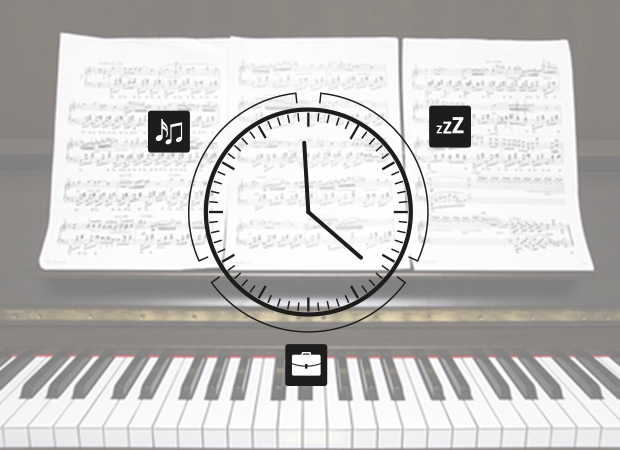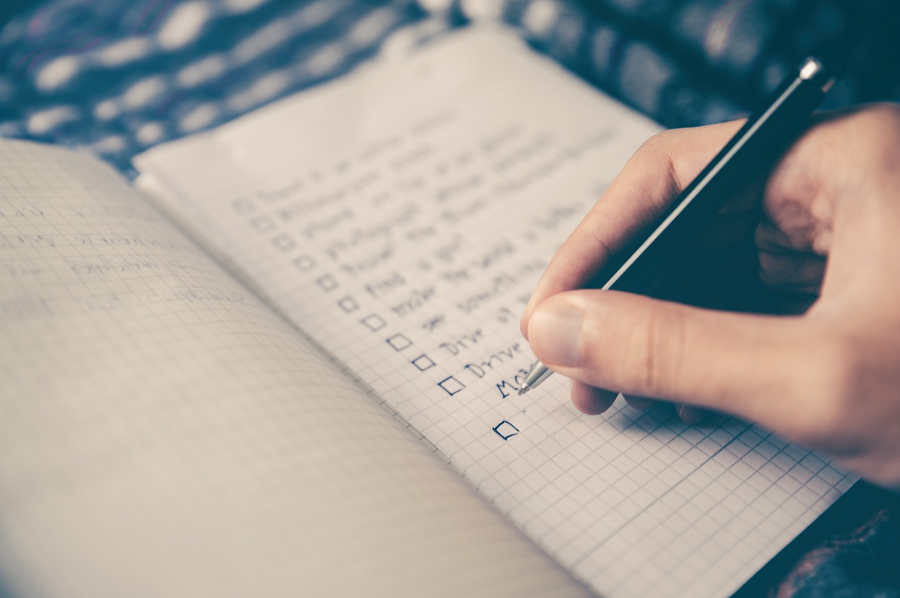Scales are the foundation for playing the piano well. Learn to play major scales in no time with our easy practice exercise!

Founder and Piano teacher
Practising often becomes a kind of competition, and stories are told of great musicians who have practiced an incredible number of hours a day. Don’t let that frustrate you. You have to be realistic about how much time you can spend each day on practicing and then try to use this time as productively as possible.
We have 10 tips for you on how to learn your instrument even more efficiently.
Table of contents

It is known that our brain can only really concentrate for about 20-30 minutes. Then you should take a break. As a rule of thumb, you should practice 25 minutes and then take a 5 minute break.
Fresh air and silence are important for the breaks, because the brain has yet to process what it just learned. So don’t turn on your TV right after practicing. And if you have even less time, it doesn’t matter as long as you are focused, because regular, focused practice is basically more valuable than one hour-long session per week.
Practice 15 minutes every day rather than 5 hours once a week.

Studies have shown that it is only sleep that decides whether what has been learnt is really fixed in memory or not. Especially important for learning theoretical things (music theory, chord sequences) are the deep sleep phases, which occur during the first few hours of our sleep.
However, it is different when we train our muscle memory (e.g. finger exercises, pieces in general). The sleep phases in which we dream (REM sleep for Rapid Eye Movement) are particularly important here. This sleep phase occurs more frequently in the early morning hours than in the evening immediately after falling asleep.
Besides all the things buzzing around in your head during your everyday life, it might be hard to find time to sit down at the piano. And how can you concentrate when you’ve just come home from work or school?
You know your own daily routine best. Maybe you can find a gap that’s free every day? This will mean you can practice regularly and play the piano more as a time-out and not as “strenuous practice”. Or, you could consciously try to relax a little before the practice time, so that you don’t think about other things all the time while practicing, for example by taking a nap just before. You should note that the midday nap should not last longer than half an hour otherwise you fall into deep sleep and are not fit enough after waking up.
In the beginning, it all requires discipline, of course, but after a while the practice time becomes a habit and doesn’t seem strenuous or long anymore. However, it is not possible to say how long this will take. Anything between 18 and 254 days is possible, depending on your process.
Do you dream of playing your favourite songs around the campfire or rocking out to the riffs of your heroes? With music2me, you can learn guitar at your own pace – step by step with a system that truly helps you progress, whether you’re a beginner or already advanced.
Over 400 video lessons & downloadable sheet music
Interactive tools like Skill Check & smart practice mode
Weekly live classes & personal teacher support
Exclusive Discord community for motivation & exchange
Don’t be too demanding. In order not to lose the motivation to play, you should choose simple pieces of music written for beginners.
These songs should not feature any fast runs. Only choose songs you can listen to and watch beforehand.
In addition, the pieces should only use triad chords.
 You play fast, you make mistakes fast. If you play slowly, you can concentrate better.
You play fast, you make mistakes fast. If you play slowly, you can concentrate better.
Eliminating rehearsed mistakes is extremely strenuous and laborious. So teach yourself the correct sequence right from the start.
Write down what you’re not so good at. And write down what you’re already very good at. Write down what you want to learn.
If you want to be really efficient, create an exercise plan.
 You don’t do any sports without being warmed up, do you? It wouldn’t be good idea, anyway!
You don’t do any sports without being warmed up, do you? It wouldn’t be good idea, anyway!
The same applies to learning and practicing with the instrument. Warm up your hands and brain. Don’t set your goals too high.
To warm up, you should choose the same song for each exercise.
 For each time you practice, set yourself a goal that you can achieve in this lesson. This can be, for example, to master the first 4 bars of a song perfectly.
For each time you practice, set yourself a goal that you can achieve in this lesson. This can be, for example, to master the first 4 bars of a song perfectly.
Do not set your aims too low either – just stay realistic in your approach.
Instead, divide your big goal into small sections so every step feels like progress. Divide a song you want to learn into bars. Learn each one and then connect them all together.
Practicing does not mean repeating the passages you have already mastered. Instead you should concentrate on the parts that give you trouble.
Do not skip these parts, but take time (approx. 15 minutes) per exercise unit to practice them over and over again.
You will soon notice that you are getting better and better, and before you know it you will be playing these parts fluently.
It is difficult to assess one’s own ability objectively.
Present to your friends or family the pieces that you have learned. Then insist on honest feedback.
They will be able to tell you which parts still sound shaky and where you need to improve. Maybe it will even become obvious that you can already get to grips with more difficult songs.
If you can’t find an audience for feedback, try recording yourself. It can be much easier to hear what you really sound like when you don’t have to concentrate on playing.
Scales are the foundation for playing the piano well. Learn to play major scales in no time with our easy practice exercise!
Bending is an essential technique for rock and blues. Learn how to pull the strings on the electric guitar. Plus: 6 tips for improving your technique.
Learn to play power chords! We show you the structure, chords and useful tips. Plus: Get the main chords in a chart download.